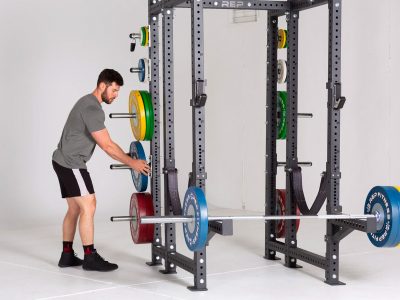Ever wondered exactly how much your bench press bar weighs?
This comprehensive guide will cut through the confusion and provide precise details about different types of bars and their weights. Intrigued? Let’s get lifting!
Bạn đang xem: How Much Does A Bench Press Bar Weigh Updated 07/2024
Understanding the Weight of a Bench Press Bar
Standard bench press bar weight
In the realm of strength training, there’s a universal standard that remains constant across gyms globally: the weight of a standard bench press bar.
At an established 45 pounds (20.4 kg), this is the expected heft that both novices and pros will encounter when they first hoist up that steel rod for their exercise set.
This benchmark serves as a helpful baseline from which individuals can gauge their progress, adding additional weights symmetrically on each side to increase resistance incrementally.
This consistency plays an essential role in establishing benchmarks for performance in competitive lifting events, ensuring everyone is indeed playing on an equal field using identical equipment standards.
It provides a predictable environment for athletes to train effectively and assess their improvements over time with precision.
Olympic bench press bar weight
The Olympic bench press bar is a popular choice among gym-goers, and it typically weighs between 45 to 55 pounds (20.4 to 24.9 kg).
This weight range allows for progression over time as you build strength and endurance.
The heavier end of the spectrum can challenge experienced lifters, while the lighter end is suitable for beginners or individuals who may have specific limitations.
When selecting an Olympic bench press bar, it’s important to consider your own fitness level and goals. Start with a weight that feels comfortable yet challenging, allowing you to maintain proper form throughout your workout.
Other types of specialty bench press bars
In addition to the standard and Olympic bench press bars, there are several other specialty bars that you may come across at the gym.
These bars offer different variations and grip options for your bench press workout. Here are some of the most common types:
- EZ Curl Bar: This bar has curved or zigzag-shaped grips that allow for a more comfortable hand position during curls or close-grip bench presses. It typically weighs around 15 to 25 pounds (6.8 to 11.3 kilograms).
- Cambered Bar: The cambered bar features a curved shape that helps to target specific muscle groups during bench presses, such as the triceps and upper back muscles. It usually weighs between 45 and 55 pounds (20.4 to 24.9 kilograms).
- Football Bar: Also known as the multi-grip or Swiss bar, this specialty bar has various angled handles that allow for different hand positions during bench presses. It typically weighs about 60 to 65 pounds (27 to 29.5 kilograms).
- Safety Squat Bar: Although primarily designed for squatting exercises, some gym-goers also use this bar for bench presses due to its unique design that places less stress on the shoulders and wrists. It weighs around 60 to 65 pounds (27 to 29.5 kilograms) like a regular football bar.
- Buffalo Bar: The buffalo bar is similar in shape to the cambered bar but offers a more neutral hand position, which can be beneficial for individuals with shoulder issues during bench pressing. It generally weighs between 45 and 55 pounds (20.4 to 24.9 kilograms).
Factors Affecting Bench Press Bar Weight
Length of the bar
Xem thêm : Is Rowing Machine Good For Your Back Updated 07/2024
The length of the bench press bar is an important factor to consider when determining its weight.
Standard bench press bars are typically 7 feet long, while Olympic-style bars also come in a variety of lengths, ranging from 6 to 8 feet.
The longer the bar, the heavier it tends to be. For instance, Olympic-style 7-foot long bench press bars usually weigh around 44 to 45 pounds (20 to 20.4kg).
On the other hand, shorter bench press bars like those used for smaller training areas or specialty exercises can weigh less than the standard 44-pound mark.
It’s essential to take into account that different bar lengths may have varying weight capacities and specifications based on their intended use and design.
Thickness of the bar
The thickness of the bar is another factor that can affect the weight of a bench press bar. Thicker bars tend to weigh more, while thinner bars are lighter. It’s important to note that the diameter of the bar can vary based on its type and purpose.
For example, Olympic-style bench press bars typically have a standard 2-inch diameter throughout their length.
On the other hand, specialty bars like Swiss bars or safety squat bars may have different diameters depending on their design.
Having an understanding of the thickness and diameter of a specific bench press bar will help you determine its weight accurately.
This information is especially helpful if you’re looking for a specific weight range or need to adjust your lifting routine accordingly.
Presence of end caps
The presence of end caps on a bench press bar can affect its weight. End caps are the metal pieces that secure the weights on each side of the barbell.
While they may seem like minor components, they can add a few pounds to the overall weight of the bar.
This means that if you’re using a bar with end caps, it may weigh slightly more than the standard 45-pound (20.4kg) or 55-pound (24.9kg) Olympic bench press bars.
Xem thêm : How To Avoid Knee Pain During Leg Extensions Updated 07/2024
It’s important to keep this in mind when determining the total weight you’re lifting during your bench press workouts.
How to Determine the Weight of Your Bench Press Bar
Use a scale to weigh the bar
To determine the weight of your bench press bar, one simple method is to use a scale. Place the bar on a scale and ensure that it is balanced evenly. This will give you an accurate measurement of its weight.
Keep in mind that different types of bars may vary in weight, so consulting the manufacturer’s specifications can also be helpful.
By using a scale or referring to the specifications provided by the manufacturer, you can easily determine the weight of your bench press bar without any guesswork.
Consult the manufacturer’s specifications
To determine the weight of your bench press bar, one of the easiest and most reliable ways is to consult the manufacturer’s specifications. Each barbell can have slightly different weights due to variations in materials or design.
By referring to the manufacturer’s information, you will get accurate details about how much your specific bar weighs.
Keep in mind that manufacturers usually provide this information for each type of bench press bar they produce, including standard bars and Olympic bars.
Additionally, you may also find specifications for specialty bars like Swiss bars or trap bars if you happen to be using those.
Conclusion
In conclusion, the weight of a bench press bar can vary depending on its type and purpose.
The standard bench press bar typically weighs around 45 pounds (20.4 kg), while Olympic-style bars can weigh between 45 to 55 pounds (20.4 to 24.9 kg).
Factors such as length, thickness, and end caps also affect the overall weight of the bar.
To determine the exact weight of your bench press bar, it’s best to use a scale or consult the manufacturer’s specifications.
So now you know exactly how much that bar is weighing down when you’re pushing for those gains!
Nguồn: https://usgyms.net
Danh mục: Gym Equipment










